- Home
- Gregory Ashe
Police Brutality (Hazard and Somerset: A Union of Swords Book 2) Page 2
Police Brutality (Hazard and Somerset: A Union of Swords Book 2) Read online
Page 2
“What he means,” Rebeca said with a roll of her eyes, “is that a lot of the more progressive types think it’s too close to a church-state thing. You know, like an unofficial endorsement of Christianity. I guess there have been petitions, complaints, that kind of thing.”
Hazard’s eyes, the color of amber, narrowed. “That makes sense.”
“Ree,” Somers said, turning on him.
“It does. We don’t do anything for Hanukkah. Or for Diwali. Or Kwanzaa.”
“But it’s a tradition. And I wouldn’t mind if we did something for those holidays too. Doing one doesn’t have to be exclusive of the others.”
“Well, you can imagine how well even the possibility of canceling it went down,” Rebeca said. “Someone at work told me those Bright Lights people were scurrying all over City Hall when they caught wind of it. The news picked it up in Columbia, if you can believe that.”
“Why didn’t we hear anything about this?” Hazard said.
“If you two could drag each other out of bed for five minutes—hey, sweetie. Didn’t see you there.”
Raquel had reappeared, holding out Evie. “She said she wanted you.”
With a smile he couldn’t quite hide, Hazard accepted Evie and tucked her into his shoulder. She settled in, obviously familiar with the spot, her nose running freely onto Hazard’s coat.
“For the record,” Somers said as soon as Raquel had vanished back into the crowd, “we don’t spend all our time in bed.”
“No,” Noah said, “sometimes you order pizza.”
“And sometimes you come to our place,” Rebeca said. “When we beg you. When we make an appointment two years in advance.”
“You two are just jealous,” Somers said, flushing but grinning. “You wish you still had chemistry.”
“Six kids, losers,” Noah said, holding up a hand.
Rebeca slapped him five.
“And we manage to take showers before we go outside,” Rebeca said.
“That was one time,” Somers said, his face burning.
“Move back, folks, move back. Right now, please. Move back. Miss, you’re way too far forward. Move back so everybody can see. We want everybody to get a good view.”
The man coming along the edge of the crowd wore a Wahredua PD uniform, waving a nightstick to demarcate an invisible line, forcing everyone in his path behind it. He had thick curls of auburn hair visible under his cap, and although he was smiling and his tone was polite, something about him made Somers think he would have preferred cracking a few heads to shuffling a crowd.
“Who’s that?” Hazard asked, adjusting Evie’s weight against his chest.
Noah looked at Rebeca. Rebeca shrugged.
“That’s Conor,” Somers said. Then, with a grin: “Patrick’s cousin. See? Proof that I leave the house sometimes.”
“Conor?” Hazard frowned. “I know all the Foley boys; there’s no Conor.”
“He’s a Kelly. I guess he moved here from Kansas City. Cravens has been hiring more uniformed officers, and he was KC police for ten years.”
“That’s strange,” Hazard said. “Why would he come to Wahredua?”
Rebeca laughed. “That’s how you always sound. Believe it or not, Emery, it’s actually very charming. Lots of people come here and don’t want to leave.”
“He was ten years towards a pension. Why give that up and start over here?”
“You did,” Noah said.
“I didn’t have a choice.”
Noah blushed and shoved his hands in his pockets.
Raised voices came from the edge of the crowd, filling the silence that had fallen over their small group. Street lights provided a weak, ambient glow, enough for Somers to see signs, although he couldn’t read their messages. He listened to the chanting.
“Prince of Peace? Is that what they’re saying?”
“Yeah,” Rebeca said, glancing at Noah. “That’s what they’re saying.”
“Who is it?” Hazard stretched up on tiptoes, one big hand securing Evie to him. “Peace now,” he said with the sound of someone reading. “Peace at home and abroad. True Christians embrace peace. Jesus, at least it’s not those Bright Lights ass—uh, jerks.”
“You know them?” Somers asked Noah and Rebeca.
The pause was just long enough.
“Yeah,” Noah said. “People from our church.”
“Kind of the more, um, dedicated ones,” Rebeca said.
Imitating his boyfriend, Somers stretched up, trying to see over the crowd. The demonstration was disrupting the festive atmosphere, and the crowd had fractured as people tried to get away from the chanting and the signs. For a moment, Somers had a relatively clear view of the men and women.
“That’s the pastor, right?” Somers pointed to a small figure with a quiff of ginger hair. The body type, with narrow shoulders and wide hips, was visible in spite of the man’s winter gear, and Somers remembered some of the things he’d heard about the pastor—and some of the insults he’d heard the Ozark Volunteers shouting. “What’s their name?”
“His name,” Rebeca said, emphasizing the pronoun slightly, “is Wesley. And he’s really great. In fact, Emery, I think you’d really like him.”
“No,” Hazard said, like someone checking two plus two. “I wouldn’t.”
“He probably wouldn’t,” Somers said. “He doesn’t like most people.”
“I like people,” Hazard said. “I like you. Sometimes. Most of the time.”
“It’s like every day is Valentine’s.”
“Ass—” Hazard began again, then glanced at Evie. To Noah and Rebeca, he asked, “Why aren’t you guys over there?”
“It’s not really our flavor of church,” Noah said. “The Sunday services are great, you know? But then Wesley has all this other stuff during the week.”
“Too extreme,” Rebeca said. “Definitely not what we’re looking for.”
The chanting had gotten louder, and although the crowd was shifting and moving away from the noise, only a few people really seemed too upset. It was hard, Somers thought, to be angry with people who wanted peace. One man, probably in his forties—with a blocky head and average features—shouted a few obscenities back at the demonstrators; everyone else settled for looking.
On the stage, however, Naomi’s face was an expressionless mask as she whispered something to Martha Cravens, Chief of Police. Cravens shook her head. She shook her head again. Naomi made a stabbing gesture, pointing out at the demonstrators, and then jabbed her finger toward Cravens. After a moment, Cravens nodded, her shoulders slumping, and trudged the length of the stage. The chief beckoned to Conor Kelly, who was practically bouncing with excitement, and to Janie Carlson, pregnant enough to pop, and Walt Hoffmeister, in uniform even though he was technically on administrative leave. Cravens was launching into some kind of explanation when the microphone squealed and Naomi’s voice came over the speakers.
“Merry Christmas, everyone!”
An answering cheer went up through the crowd.
“I am so excited to be here with you tonight.”
Naomi looked like perfection: flawless skin, flawless dark hair, winter pale. She was so much like Cora, Somers’s ex-wife, that for a moment, Somers remembered what it had been like to be young and in love with his high school sweetheart. Even bundled in a coat and hat and scarf, Naomi somehow gave the impression that she’d just hopped off a runway, like whatever she wore underneath was the latest thing out of Milan or Paris. And for all Somers knew, it might be; Naomi always had one more surprise waiting.
“I grew up in Wahredua, as many of you know.”
From the edge of the crowd came a surprised shout. And then, an angry one. “Get your hands off me.”
Naomi’s face didn’t change. “For me, the Christmas tree lighting was the most beautiful night of the year. It represented hope—”
“No, you back off. Back the fuck off right now.” Tha
t sounded like Kelly, getting hot under the collar and liking it.
“—and it represented,” Naomi continued, “a belief that traditional family values, the values that made Wahredua such a great place to grow up, could continue to shape our future—”
“That’s assaulting an officer, you tranny cunt.” That voice was Hoffmeister’s, and Somers shrank at the words, feeling a physical discomfort like a flash of fever. The words were followed by the sound of a blow, and gasps worked their way through the crowd.
“—traditional family values—” Naomi was saying again, trying to get everything back on track.
A few more heavy blows broke the winter air, and the crowd felt electric. Somers felt it: a wild, panicked energy that came from being part of a group of terrified people. Even though he was police. Even though he was smart and independent. That kind of energy was contagious, and it was running wild. Hazard’s scarecrow eyes were wide, his pupils dilated, his breathing controlled as he pressed Evie to him. Noah looked like he might be sick; Rebeca had her hand in her purse, probably grabbing pepper spray or, for all Somers knew, brass knuckles.
At the stairs to the stage, a struggle broke out. Someone bundled in a camouflage jacket and a canvas cadet cap was pushing up the steps, past two men who were trying to catch her arms and turn her away: a heavy guy, sweating in spite of the cold, and a man named Bob Sackeman, whom Somers and Hazard had run into on their last case. The woman spun, slipping free of the heavy man’s grip, dropping her shoulder as she crashed into Sackeman. Sackeman, a glorified pencil pusher, dropped with an explosion of breath that interrupted Naomi’s speech. The mayor stopped and turned, her face blank with what Somers imagined must have required a great deal of effort.
Then the woman in the camouflage jacket and the cadet cap crashed into Naomi, driving her away from the podium. Grabbing the mic, the woman shouted into it, causing a feedback screech that obliterated her first words.
“—death, death, death, death, death, Officer Hoffmeister must die, kill every last one of those fucking pigs—”
Then the heavy guy, sweating worse than ever, flattened her to the stage.
CHAPTER THREE
DECEMBER 16
SUNDAY
9:17 PM
SOMERS HAD TO GET INVOLVED at that point; it seemed like every peace officer in the county was involved. While Hazard took Evie home, with Noah and Rebeca accompanying him, Somers switched into cop mode, shooing curious onlookers away from the stage and doing his best to disperse the crowd. As the people broke off for their cars or the cold walk home, the tree flickered sullenly to life.
“Well, that was a disappointment.”
Jonny Moraes was young for a detective, black on his father’s side, Brazilian on his mother’s, and tonight, inside the puffiest down jacket Somers had ever seen, he looked miserable.
“It’s winter,” Somers said. “You might think about getting something warm.”
“My mom’s people come from the tropics. Thin blood, you privileged fuck.”
Somers grinned. “How bad is it over there?”
Moraes followed his glance, studying the line of demonstrators who sat, handcuffed, on a snowy curb. “Only one of them is really mad; the rest are pretty pleased with themselves, I think.”
“The pastor?”
“Hoffmeister is a moron.”
“He’s facing assault charges already for the damage he did at the last demonstration. He’s been riding a desk for two months. Why the hell would he risk something like that again?”
“Hoffmeister,” Moraes said, shivering inside his massive jacket, “is a moron.”
“Is the pastor hurt?”
“Dignity more than anything else.”
Shouts on the stage drew Somers’s attention. The woman in the camouflage jacket was still prone on the platform, hands cuffed at the small of her back. Although having her face planted in the boards must have made it difficult, she was still delivering threats with as much air as she could pull into her lungs.
“—every treacherous, traitorous, overbearing, illegally-appointed and unconstitutionally-authorized government official intent on depriving citizens of their rights will be drawn and quartered after facing the righteous judgment of a free people—”
“So is she your date?” Somers asked.
“Your mom was busy,” Moraes said.
“Sorry, I couldn’t hear you from inside that coat.”
Moraes flipped him the finger. “I don’t get it. I thought the mayor was on the good side of these lock-and-load assholes. Wasn’t that the whole point? That’s how she got elected, right?”
“Something must have changed,” Somers said.
“—in the new and everlasting matriarchy that will be established, built as a circle of equals instead of a masculine line of power, with the womb as the locus of creation and the vagina as the chalice of life—”
Moraes scrubbed at his forehead. “Yeah, something’s definitely changed.”
Kelly and his cousin Foley were getting the woman upright. As she came up, she started spitting and hissing, kicking out, writhing like she meant to pitch all three of them off the stage. She managed to throw off Kelly with the first burst of movement, and he stumbled clear, his face twisted with rage.
That look twisted something in Somers’s stomach; he launched himself up onto the stage and darted forward, catching Kelly’s arm as Kelly grabbed his service weapon.
“Are you out of your fucking mind?” Somers said.
Kelly planted a hand on Somers’s chest and shoved, but Somers shifted his weight.
“Drop your fucking hand,” Somers said, his hand still holding Kelly’s wrist in a pincer. “Right fucking now.”
Behind Somers, Foley shouted, “Down, bitch, back on the fucking ground, down, down, back on the fucking ground.”
“Every news station in the country is going to see this,” the woman was screaming, “everyone in the whole country is going to see this. Everyone is going to know that the fascist pigs in this shit heap are running everything, everyone’s going to know, everyone’s going to—”
Somers threw a look over his shoulder; Moraes was helping Foley subdue the woman again, and together, they dragged her toward the steps. Somers stayed where he was, hand locked on Kelly, until they had shut the woman in a patrol car; her screams came through the glass, muffled but still full of rage.
“If I ever see you touch your service weapon—” Somers began.
“Fuck off,” Kelly said, catching Somers hard enough with another shove that, this time, Somers spilled off the stage and into the snow. Somers swam in the drift, trying to get his feet under him, his whole world narrowing down to one objective: beat the shit out of Conor Kelly. “You just stood there and watched the whole thing. If you hadn’t been so busy grabbing ass with your fag—”
“Hey guys.” The voice that interrupted was bright, friendly, everybody’s best friend. “Hey Somers.”
From within the drift, Somers rolled his eyes and nodded at his partner. “Hi, Gray.”
“Kelly,” Gray Dulac said.
Kelly stared at both of them, his face flushed almost as red as his hair.
“I think I must be having a hard time hearing,” Dulac said, running a hand through tousled dark hair. “I know I just said hello to Officer Kelly, but he didn’t say hello back. And I thought I heard Officer Kelly use an offensive slur against another member of the department, but I know that can’t be right, because Officer Kelly is a new guy, low man on every fucking totem pole in the city, and I’d hate it if I had to spend the next week making sure his ass got kicked to the curb.”
Everything froze except the flicker of Christmas lights.
“I guess I better test my hearing,” Dulac said. Under the thick smattering of freckles, he wore the same expression he always wore: so intensely earnest that he reminded Somers of a kid who could play altar boy half the day and spend the rest of it burning
down orphanages. “Hi, Kelly.”
Another heartbeat passed. “Detective Dulac.”
“Well, look at that. I guess my hearing is back to normal. So I didn’t hear that other thing, right? That was a mistake?”
“You didn’t hear anything,” Kelly said, stalking toward the steps and bounding off the platform.
“I could have handled that,” Somers said from inside the drift. Snow had filtered up his sleeves and under his shirt and was melting now in icy trickles.
“I know,” Dulac said, dropping into a squat so he and Somers were face to face.
“Thanks, though.”
“Sure,” Dulac said, smiling like he’d just tricked another kid to paint a fence for him, or some Tom Sawyer-shit like that. “We’re partners, right?”
“Right, but—”
Still grinning, Dulac grabbed a handful of snow and rubbed it into Somers’s face.
“Now let’s get back to the station,” Dulac said, strolling away while Somers sputtered and tried to decide if his face was frozen solid. “We caught something.”
CHAPTER FOUR
DECEMBER 16
SUNDAY
9:34 PM
ON SUNDAY NIGHT, Wahredua’s police station should have been silent and empty; instead, it was full of off-duty officers pulled in to handle the chaos from the tree-lighting ceremony. Half the officers weren’t in uniform, which made it hard to separate them from the demonstrators who had been hauled in, or from the crowd of over-eager citizens who were certain that their eyewitness statement was essential to the safety and security of Wahredua.
“This couldn’t wait until tomorrow?” Somers said.
“Maybe,” Dulac said, twisting between a pair of drunken brothers who were shouting about which one of them was going to give a statement first. “Jesus, it looks like half the town is in here.”
“Half the town probably is in here,” Somers said. “The half that likes to phone in and demand an officer on the scene, stat, because their neighbor’s pet rabbit got into the garden. Some people just eat this shit up.”
The press of bodies eased somewhat when they reached the bullpen, where desks were reserved for detectives and a few open workspaces were kept available for patrol officers. A middle-aged woman in a cardigan was holding an empty carafe, looking around like she might spot another supply of coffee.

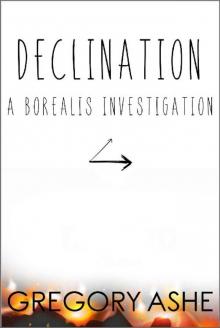 Declination
Declination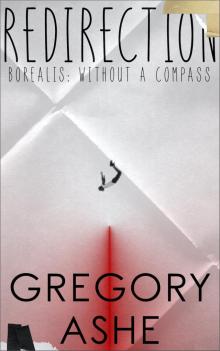 Redirection
Redirection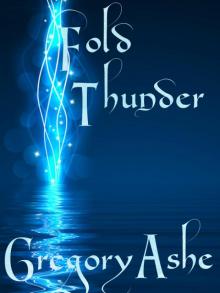 Fold Thunder
Fold Thunder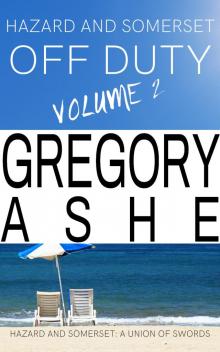 Hazard and Somerset
Hazard and Somerset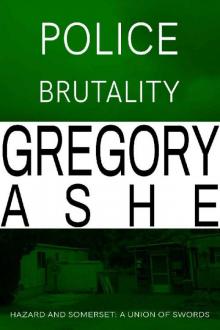 Police Brutality (Hazard and Somerset: A Union of Swords Book 2)
Police Brutality (Hazard and Somerset: A Union of Swords Book 2)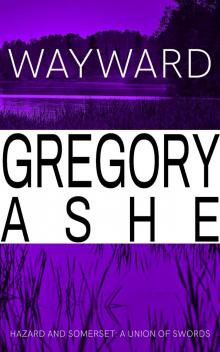 Wayward
Wayward The Same End (The Lamb and the Lion Book 3)
The Same End (The Lamb and the Lion Book 3)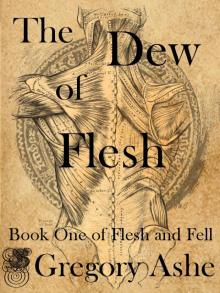 The Dew of Flesh
The Dew of Flesh The Same End
The Same End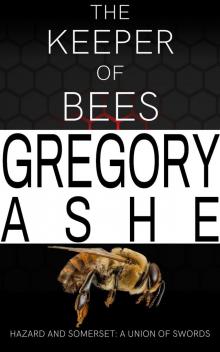 The Keeper of Bees ARC
The Keeper of Bees ARC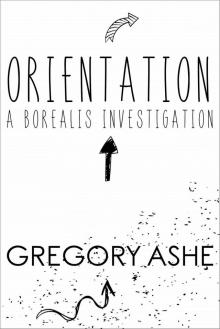 Orientation (Borealis Investigations Book 1)
Orientation (Borealis Investigations Book 1)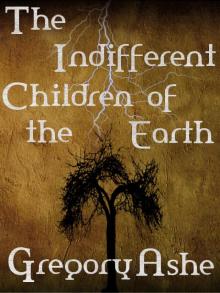 The Indifferent Children of the Earth
The Indifferent Children of the Earth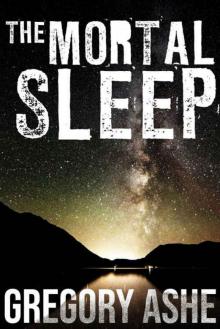 The Mortal Sleep (Hollow Folk Book 4)
The Mortal Sleep (Hollow Folk Book 4)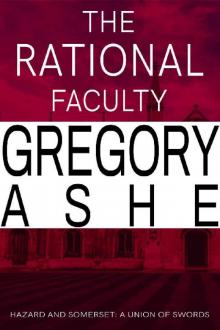 The Rational Faculty (Hazard and Somerset: A Union of Swords Book 1)
The Rational Faculty (Hazard and Somerset: A Union of Swords Book 1)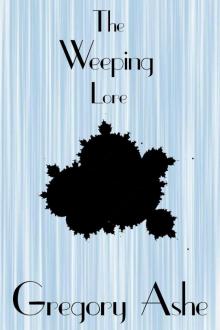 The Weeping Lore (Witte & Co. Investigations Book 1)
The Weeping Lore (Witte & Co. Investigations Book 1)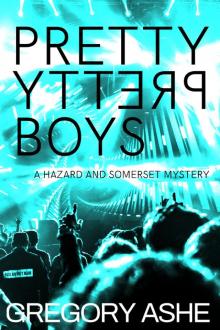 Pretty Pretty Boys
Pretty Pretty Boys Transposition
Transposition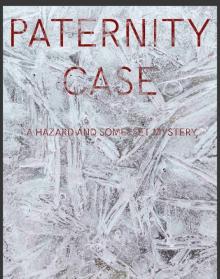 Paternity Case
Paternity Case